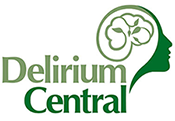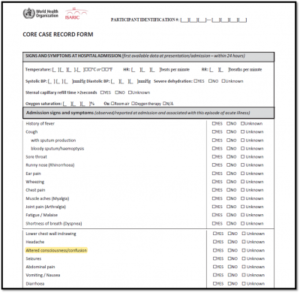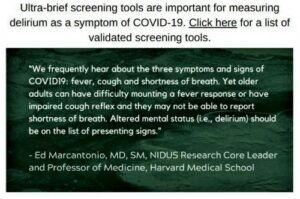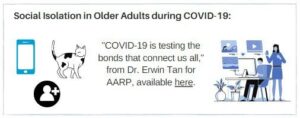COVID-19 Resources
COVID-19 & Delirium
Delirium is a common presenting symptom of severe illness in older adults. Thus, with a suspected COVID-19 diagnosis, mental status should be assessed. Moreover, if delirium is present, suspicion should rise for the presence of COVID-19, as well as the potential for a more severe infection. Older adults are most vulnerable to severe infection with COVID-19 and mortality. Here, we provide you with some resources relevant to COVID-19 and delirium to assist you in the care of older adults.
What is delirium and what does it have to do with COVID-19?
Delirium is an acute confusional state that is common among hospitalized elders and is strongly associated with poor short-term and long-term outcomes. Delirium is preventable, and non-pharmacologic methods are effective for prevention and management. Pharmacologic management of delirium should be reserved for extreme cases of agitation.
Atypical Presentations of COVID-19 in Older Adults
Delirium is a common atypical presentation of COVID-19 in older adults. In a study of 817 older adults with documented COVID-19 infection presenting to 7 EDs across the U.S., delirium was the sixth most common of all presenting symptoms and signs, occurring in 28% of patients. Among the patients with delirium, 37 (16%) had delirium as a primary symptom and 84 (37%) had no typical COVID-19 symptoms or signs, such as fever or shortness of breath.
The World Health Organization (WHO) core case record form for COVID-19 includes “altered consciousness/confusion” as a presenting symptom of COVID-19. Click on the image below for more official guidance from the WHO.
COVID-19 Delirium Prevention Toolkit
COVID Toolkit
Patient Toolkit with all the materials necessary to help older adults maintain cognitive and physical functioning – and prevent delirium – during their hospital stay. This toolkit is designed to help older adults who are in isolation with no volunteer/family visiting and limited interaction with hospital staff. This resource is applicable for many settings, including but not limited to acute care, long-term care, and the emergency department. Click here to access the COVID-19 Toolkit.
The Geriatric Emergency Department Collaborative and Regional Geriatric Program Toronto: COVID-19 Delirium Resources
The following one-pager from the Geriatric Emergency Department Collaborative is specific to identifying, preventing, and treating delirium in the ED in regards to the COVID-19 pandemic: https://gedcollaborative.com/wp-content/uploads/2020/03/JGEM_Vol1Issue4_Supplement1.pdf.
Advance Care Planning and Palliative Care
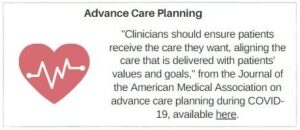
Considering advance care planning with older adults during COVID-19 is extremely important for patients, family members, and clinicians. For resources to help you facilitate those discussions:
- Diane Meier, MD, Director of Center to Advance Palliative Care (CAPC): Having an Advanced Care Plan Conversation with an Older Adult
- COVID-19 Resources from Respecting Choices: Resources for Having Conversations with Older Adults when Care Planning for COVID-19
- The Conversation Project: Being Prepared in the Time of COVID-19: Three Things You Can Do Now
- When considering palliative care for an older adult with COVID-19:1)Getting Ahead of COVID-19 Issues: Dying from Respiratory Failure Out of the Hospital by Joanne Lynn for Health Affairs 2)COVID-19: Decision Making and Palliative Care from Swiss Medicine Weekly 3)COVID-19: Tips for Dementia Caregivers by the Alzheimer’s Association
COVID-19 Conversations
The National Academy of Medicine and American Public Health Association are hosting a webinar series called “COVID-19 Conversations” on the most relevant topics related to the global pandemic, featuring medical and public health experts. You can tune into the live webinars or watch recordings of previous webinars on their site.
Care of Older Adults in Post-Acute and Long-Term Care Communities
- Preparing for COVID-19:Long-term Care Facilities, Nursing Homes(from the CDC)
- When COVID-19 is in your regional community (i.e., community spread) from the Society of Post-Acute and Long-Term Care Medicine
Additional Resources
- Telemedicine: A Practical Guide for Incorporation into your Practice by ACP
- CMS Video: Medicare Coverage and Payment of Virtual Services
- The John A. Hartford Foundation: COVID-19 Resources for Older Adults and Family Caregivers, and Healthcare Providers
- Health in Aging: 12 Ways to Ease Isolation While You’re Practicing Social Distancing
